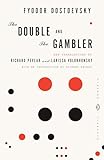To satisfy his creditors, Fyodor Dostoevsky famously wrote The Gambler in four weeks. He was a roulette demon with a habit of losing more than he won. If he finished this new book in less than a month, all his debts would be cleared; if he failed, he’d lose everything. Dostoevsky pulled it off, of course; and in a final coup, he later married the stenographer who’d helped him.
 I’ve read the big Dostoevsky novels, but nothing of his ever stuck with me quite like this story behind the story, a Behind-the-Music tale for the literary history books. No one ever argues that The Gambler is Dostoevsky’s best, but still — how was it possible to create a coherent story in such a short time? What did it feel like to compose so rapidly, and under such terrible pressure?
I’ve read the big Dostoevsky novels, but nothing of his ever stuck with me quite like this story behind the story, a Behind-the-Music tale for the literary history books. No one ever argues that The Gambler is Dostoevsky’s best, but still — how was it possible to create a coherent story in such a short time? What did it feel like to compose so rapidly, and under such terrible pressure?
I first learned of Dostoevsky’s gamble in graduate school when I was a 22-year-old babe taking his first steps into the woods. I wrote a novel as my MFA thesis, and I had grand ambitions for myself and my work. Skip ahead eight years, and I still thought of myself as an aspiring novelist, but there was one problem: I hadn’t published anything. Not even a lick of a story online. This might not have worried me except for one new wrinkle: I was about to be a father. I had not yet written the book that I wanted to write. I knew that having a baby didn’t mean I could never write again. But I did know that I wouldn’t have the time or the leisure that I’d had previously.
I began my first compositional race against the clock late on a Monday night in December. I barricaded myself into our spare room — destined to be the baby’s room. Fifteen hundred words, I told myself. Just do fifteen hundred words a day. The story came easier than I expected. It proved easier than I thought to create characters as I went. Coming and going each day was not that hard because I would think about the story during the day while at work.
By the end of the month I had 70,000 words about (what else?) a young man with artistic aspirations who was worried about having a baby because he still hadn’t made his mark in the world. I re-read the whole manuscript and I was surprised at how good it was. Not objectively good — trust me, the piece had problems — I mean it was surprisingly good for me. An idea had been made flesh. Forget what I had made: I had done something that felt important for me.
The baby arrived before I finished revisions on the book. But that’s all right — being a Dad did not turn out to mean abdicating as an artist. An agent picked up the manuscript the next spring, and we sent it out to publishers just in time for my little girl’s first birthday. Too quiet, they said. Lovely, they said, but no way to sell it. Put it away, the agent said. Think about something new.
On one hand, this was terrible news. On the other hand, the rejection carried less sting because I had spent less than eighteen months on this manuscript — far less than the years that I had spent on previous failed efforts to sell a novel.
I do not know when I decided to do it all over again. My daughter was old enough that her sleep patterns were predictable. I had notes on the storyline that I wanted to tell. I knew that I could make the dining room table work for a month as my desk — now that the spare room was gone — and yet, I kept putting off the project.
Finally one March evening while I sat in a parking lot waiting for Chinese take-out, I realized that what I needed was a partner. I wrote a text message to my friend, the musician Matt Lenny, who I knew was trying to overcome his own perfectionist habits and record an album. I proposed a contest. He would compose, perform, and record a full album, and I would draft the text of a new novel — all within a thirty-day period. Then we’d get someone to judge which was better.
I have good news and bad news about this contest. Good news: I wrote over 2,500 words after work each day, and Matt recorded twelve tracks on weekends and late at night, and we both limped across the finish line in time. We were relieved and a little giddy afterward and proud of what we had done. Here’s the bad news: Matt didn’t like the songs enough to release the album in their current form. And my agent hated the novel. So everything went into the deep freeze of the hard drive.
My grad school mentor, the brooding and kind-hearted author David Plante, would sometimes refer to unsuccessful books as “one more for the river.” As a student in his twenties with a chartless ocean of writing challenges ahead, this metaphor made me uneasy because I so desperately wanted to arrive somewhere with my work. But more than a decade later, after trying and failing repeatedly to sell a work despite mustering all the inner creativity that I had, I began to see how important David’s metaphor was. There is a freeing quality to the sense that you have only a brief relationship with writing that you care for and craft as best as you can. In the end it’s all just ballast.
The duel between Matt and I had no tangible artistic outcome. It barely made a ripple in the river. Yet I return often to the story of what we did when I speak about writing and why I enjoy it. What was there about that torturous month that enlivened me so? Perhaps it was the competition. Or the sense that I did not have the time to doubt what I was doing or what I was creating: that I just had to keep writing, keep going, keep powering through. Sometimes the means is also the end.
Finally, not long after the birth of my second child, a magazine published a short story that I had written. The magazine had a relatively small circulation, but it felt meaningful to finally have my work selected. Or at least it did for about ten minutes. The river swept up what I wrote and rolled on. Or maybe I rolled on. This is what was becoming clear: I was made happy not by the product of my writing, but by the process.
As a boy, I was afraid of so much of the world around me. I was a poor sleeper. I worried about everything and everyone. I saw the possibility of terrible events everywhere. “You’d finally relax,” my father says, “when you sat at the table in the kitchen and began to draw and make up stories. You could sit there for hours just working at the details.”
Thirty years later I was at a weeklong writing retreat in upstate New York. I spent that week in a tower studio with a view of the Hudson just outside Catskill, NY. I was the artist in residence during the low season, and so I was almost the only person there. The writing challenge that I had given to myself was this: I wanted to write an entire novel in less than a week. This was sheer masochism. But it felt like something that I could achieve. The tower had spare but comfortable amenities. I had a space heater that I would fire up whenever the temperature fell to 55 or lower; but if I ran the heater warmer than 68 degrees, the black hornets hiding in the knotholes of the tower would rouse from their sleep. Otherwise, I was alone with the latest idea that I had for a novel.
The second day of the writing also happened to be my thirty-seventh birthday. Near dusk I sat back and stared out the window at the setting sun to the west. I had written 20,000 words in the last two days, and I needed to write 35,000 more in the next two-and-a-half to fulfill my goal. I was absolutely exhausted. But I also had the sense that this was the best possible thing I could be doing with myself at that moment. This habit of writing offered me a place where I could go to contemplate the sublunar landscape of the heart — without having to stay in that dark place forever.
I finished the draft before I left the tower. I went home and edited it for a few months. Now it is a book that I am very proud of. I’d rather not tell the story about trying to sell it. Whether that book sold is not the point. The point is that writing it was a breakthrough. I saw what writing did for me, and after that, I had no more illusions about whether I was or was not a writer.
The prolific twentieth-century novelist Georges Simenon published more than 160 novels during his career, and he wrote many of them in just 11 days. It is said that John O’Hara could sit at a typewriter at the New Yorker offices and bang out a story in one go. And of course there is that inveterate old gambler Dostoevsky. Mine has been a life full of writing projects that are large and grandiose in design, even if they aren’t ultimately grand in execution. I am at the end of a sustained writing fugue that has had me write an essay a month for 24 straight months. Each challenge is useful, irrespective of what it creates. There is relief in burning on just the pure oxygen of ideas.
Whenever I wonder why I keep finding ridiculous challenges, I think about that tower upstate. In memory, I can still inhabit the space of the moment. I can still feel how I am tired — my wrists ache and my back hurts from bending over the desk, which is really just a paint-spotted board thrown over some brackets attached to the window. I miss my family. I miss the rest of the world. But I am headed somewhere. I’m channeling something. I feel like I am putting my entire self to good use. Does the world end if I break this trance to walk down three flights and return to the world again without finishing the novel that I’m working on? Do the stars fall from the sky if I give up? I suppose not. But then again, I don’t really want to find out, either. So I keep writing.
Image: Pexels/Kelly Lacy.









